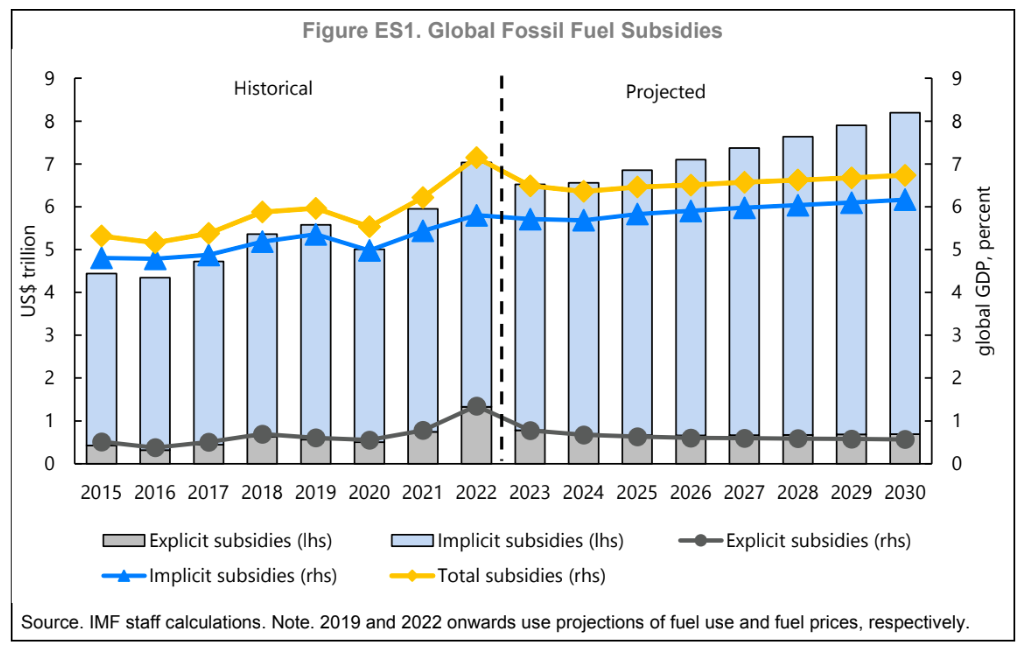CARBON SUPPORT SPLURGE
Fossil fuel subsidies soared to record $7-trillion in 2022 – IMF

Worldwide subsidies for fossil fuels surged to a record $7-trillion in 2022, equal to 7.1% of the global gross domestic product, according to a new report by the International Monetary Fund. The findings dovetail with other recent reports and come after July 2023 scorched itself into the record books as the hottest month in recorded history.
With our planet in flames, the global economy is decarbonising to contain the threat of climate change as renewables rapidly displace fossil fuels in the energy mix. That, at least, is the emerging narrative.
But this narrative has some flaws. While nails are being pounded into the coffin of fossil fuels with one hand, the other is busy pulling the nails out.
A new report by the International Monetary Fund (IMF) – a global lender not famed for hyperbole – has found that between 2020 and 2022, government subsidies to the fossil fuel sector rose $2-trillion to $7-trillion, or 7.1% of global GDP. That’s more than global government expenditure on education and two-thirds of what states spend on healthcare.
Read more here: IMF Fossil Fuel Subsidies Data: 2023 Update
This statist splurge to support consumers and business was a response to the spike in energy prices triggered by Russia’s invasion of Ukraine. The findings dovetail with other recent reports, but look at the issue from a global perspective, throwing the sheer scale of the trend into sharp relief.
Read more in Daily Maverick: Spending on global fossil fuel subsidies in 2022 shattered all-time records – report
“Explicit subsidies (undercharging for supply costs) account for 18% of the ($7-trillion) total while implicit subsidies (undercharging for environmental costs and forgone consumption taxes) account for 82%,” the IMF said.
“Underpricing for local air pollution costs and climate damages are the largest contributors to global fossil fuel subsidies, accounting for about 30% each.
 “Explicit subsidies have more than doubled since the previous IMF assessment, from $0.5-trillion in 2020 to $1.3-trillion in 2022, with sharply higher international fossil fuel prices. However, much of the increase is due to temporary price support measures, and hence explicit subsidies are expected to decline if international prices continue receding from their peak levels.”
“Explicit subsidies have more than doubled since the previous IMF assessment, from $0.5-trillion in 2020 to $1.3-trillion in 2022, with sharply higher international fossil fuel prices. However, much of the increase is due to temporary price support measures, and hence explicit subsidies are expected to decline if international prices continue receding from their peak levels.”
It’s also interesting to note who the biggest subsidisers are.
“Relative to regional GDP, however, total subsidies for Europe and North America are smallest at about 3%, while subsidies are 23% of regional GDP in CIS (former Soviet Union) and 19, 10, and 10% respectively in Mena (Middle East North Africa), South Asia and EAP (East Asia Pacific). From 2020 to 2022, subsidies increased substantially in all regions except North America,” the IMF said.
“By region, East Asia and the Pacific account for nearly half of the global subsidy. By country, in absolute terms China remains the biggest subsidiser of fuels, followed by the US, Russia, EU and India,” the IMF said.
So the US and Europe’s subsidies are small compared with their GDPs, but overall are near the top of the charts, with China at No. 1.
In the face of this surge, the IMF calls for fossil fuel subsidy reforms.
“Fully reforming fossil fuel prices by removing explicit fuel subsidies and imposing corrective taxes such as a carbon tax would reduce global carbon dioxide (CO2) emissions by 43% below ‘business as usual’ levels in 2030 (34% below 2019 levels). This would be in line with keeping global warming to ‘well below’ 2°C and towards 1.5°C,” the IMF said.
“Full fuel price reform would also raise substantial revenues, worth about 3.6% of global GDP. These revenues could be used to cut more burdensome taxes such as on those labour, help with debt sustainability, or fund productive investments.”
The findings also come against the backdrop of July 2023 scorching itself into the record books as the hottest month in recorded history, and fossil fuel usage is the biggest link in the climate change chain.
The global economy is on a path of decarbonisation, but the pace of the transition would be faster were it not for these mammoth fossil fuel subsidies. DM





















 Become an Insider
Become an Insider
We’re so @#$%^!!
And here is where the con is clear for everyone to see – remove subsidies and impose more taxes. The climate crisis and the movement against fossil fuels is a massive con I’ve seen the proposed tax rates for maritime shipping and it’s horrendous, no matter what fuel is used. The man in the street and particularly those in developing countries i.e. those that can least afford it are going to suffer the most